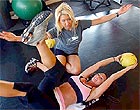What would life be like in L.A.
without another guru to guide us through the chaos? To the list that
includes spiritual advisor, yoga instructor and holistic healer add
another: personal trainer/life coach.
Sure, a personal trainer can get you through three sets of ab crunches,
but a trainer who's also a life coach may help cure your addiction to
double-tall mochas and make you realize that that relationship you're in
has "dead end" written all over it.
Life coaches have been around for more than a decade, first in the
business world, then in the personal arena to help people deal with issues
such as job ruts. It's not psychotherapy, nor does it pretend to be,
focusing on the here and now rather than dredging up the past.
Now life coaching is working its way into the fitness industry as trainers
are opting for certifications or education to better help their clients —
and boost their fees.
The health industry has long known that motivation is key to staying on an
exercise program. Trainers say that not all college exercise science
majors and certification programs teach the skills they need to help
clients stay inspired long enough to achieve their weight loss and fitness
goals. "It's a natural progression," says Daniel Martinage, executive
director of the International Coach Federation, a professional association
of personal and business coaches. "In a gym setting, a trainer can assess
someone's fitness level and give them a program to work with. But coaches
go beyond the fitness level and look at what are the goals for making
positive changes and how to set up a program to do that and keeping you
accountable."
Respected fitness trainer certification programs such as the American
College of Sports Medicine and the American Council on Exercise see
coaching as a positive trend; the former is affiliated with Wellcoaches,
an Internet-based coaching service that also trains coaches in its
self-licensed program.
"We haven't been terribly effective in scaring people into activity," says
Cedric X. Bryant, chief exercise physiologist with the exercise council.
To most of the world, "life coach" tacked onto "personal trainer" is still
a fuzzy designation at best. Although there are several life coach
certification courses, there is no standard curriculum or any regulatory
or licensing body. Some trainers call themselves coaches after taking
short-term classes or seminars.
Some psychologists and fitness industry professionals scoff at the notion.
Coaches, they say, are not supposed to dispense psychological advice or
become too involved in their clients' personal lives. They are taught to
recognize when such issues as eating disorders are beyond their
capabilities. But can a client trust they'll know how?
"It's a buyer-beware situation," says Dr. George Stricker, research
professor of psychology at Adelphi University in Garden City, N.Y. "In an
ethical framework, you have to look at to what extent is a person
competent to handle a problem of that sort. The less education,
experience, training and supervision they have, the less they'd be able to
do a competent job, and they may be compromising the person they're
working with."
The term "life coach" makes some people bristle. Greg Isaacs, owner of a
fitness studio in Brentwood who has trained Pierce Brosnan, Clint Eastwood
and Brooke Shields, finds the term "pompous and arrogant." "As fitness
people, our job is to ask you what were the obstacles that prevented you
from exercising — we do that on a daily basis," he says. "But I don't call
that a life coach. I respect certain aspects of it, but I think it's a
very broad name."
Some trainers say their interest in coaching was born of frustration at
working with clients who showed little improvement.
Fitness trainer Ron Jones has a master's
degree in kinesiology with a specialization in sports and exercise
psychology and decided to become certified with Wellcoaches after seeing
some clients struggle with achieving progress: "I would get to a certain
point and then I didn't know what else to do," explains Jones, 44,
California wellness coach. The coaching program, he says, taught him how to help his
clients achieve their goals and improve results. "Most trainers don't have
that background," he says.
One client has gone from 260 pounds to 206 since she began training with
Jones last September.
Cindy
Wilson, a 42-year-old day-care provider from Bakersfield, worked with
a personal trainer eight years ago but found the experience less than
satisfying: "She just walked me from station to station and watched me,"
she says. Jones, a friend, offered to help.
Setting small, achievable goals that produced measurable results helped
Wilson stick to her regime, as did advice on making good choices when
eating out. Wilson, who put on weight 12 years ago, doesn't think
traditional psychotherapy was necessary: "I've read enough and know enough
that I just needed someone to hold my hand and guide me along the way,"
she says.
Fitness trainer Brenda Ann Wong took a course in coaching at UCLA and uses
the techniques she learned with some clients. She doesn't call herself a
life coach, although she's considering becoming certified.
"A lot of trainers don't understand why their clients cancel, or why
they're constantly feeling fatigued, and it's not always physical. You
have to address the root," Wong says. "You have to try to understand the
client, not get mad at them."
Wong, 24, sits in a small office at Equinox in West Hollywood with
29-year-old Bronwyn Leigh, a new client who hopes to improve her diet and
shed 10 pounds she's gained since she quit smoking four months ago. Wong
has Leigh make several lists, from current dilemmas to professional goals,
and they discuss a variety of issues, ranging from Leigh's junk-food
habits to how to find a cleaning lady. "I want you to continue to add onto
the list," says Wong, "and each time we meet, I want you to check one
thing off. It mentally feels better when you have less on your plate."
After an hour of coaching, they head to the gym for another hour of
cardio, strength training and stretching. Leigh says Wong's holistic
approach to fitness makes sense so far: "Prioritizing things and getting
my life more organized will definitely help my eating habits," she says.
"If you don't have time to eat, you make very bad choices."
Times staff writer Jeannine Stein can be reached by e-mail at jeannine.stein@latimes.com.




